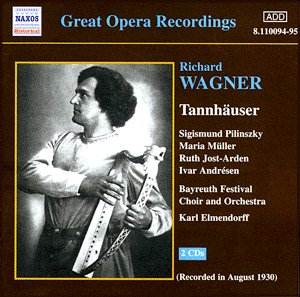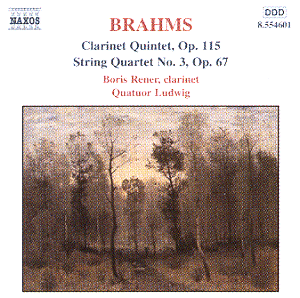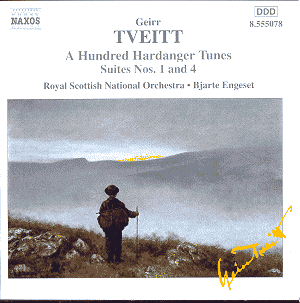 Composer: Richard Wagner
Composer: Richard Wagner
Works: Tannhäuser, opera [Paris version]
Performers: Sigismund Pilinszky (tenor, Tannhäuser), Maria Müller (soprano, Elisabeth), Ruth Jost-Arden (soprano, Venus), Ivar Andrésen (bass, Wolfram)
Recording: Bayreuth Festival Choir and Orchestra/Karl Elmendorff, Recorded at Wagner Theatre, Bayreuth, August 1930
Label: NAXOS HISTORICAL 8.110094/95
Richard Wagner’s Tannhäuser occupies a pivotal place in the operatic canon, demonstrating the composer’s evolution toward the music drama that would come to define his later works. Stemming from a tumultuous premiere in Dresden in 1845, the opera experienced a protracted journey to acceptance that included significant revisions, particularly for its Paris presentation in 1861. This historical context is crucial for understanding the choices made in this recording, which captures an abridged version of the Paris score, effectively showcasing Wagner’s burgeoning ambition to intertwine music and drama through psychological depth.
The recording is anchored by the solid but somewhat lyric tenor of Sigismund Pilinszky in the title role. While he lacks the heroic heft of the heldentenor Wagner envisioned, his interpretation is marked by a commendable lyricism that often compensates for vocal limitations. For instance, in the Act 1 duet with Elisabeth, Pilinszky’s clear diction and lyrical phrasing establish a poignant emotional connection, although moments of strain become apparent during climactic passages. This contrasts sharply with the more robust portrayals of Tannhäuser in contemporary recordings, where the emphasis often shifts to vocal power over nuanced interpretation.
Ruth Jost-Arden’s portrayal of Venus is particularly noteworthy. Her bright, fresh-toned soprano, while not possessing the seductive weight typically associated with the role in modern interpretations, offers a fascinating take on Venus’ character. The lushness of her voice brings a youthful exuberance that invigorates the bacchanal, a section that Wagner expanded for the Paris version to accommodate ballet. Jost-Arden’s breath control and legato line shine in her arias, although the seductive quality expected from this pivotal role is somewhat diminished. Comparatively, modern interpretations often veer into the dramatic mezzo territory, enhancing Venus’s allure, yet Jost-Arden’s interpretation remains compelling for its distinctiveness.
Maria Müller as Elisabeth delivers a performance that balances warmth and clarity, her lyric soprano ideally suited to the character’s emotional landscape. Her ability to convey the nuances of despair and hope within her arias, particularly “Dich, teure Halle,” stands as a testament to her vocal acting prowess. Müller’s interpretation, vibrant and engaged, remains a highlight of the recording, effectively contrasting with Jost-Arden’s Venus, thereby enhancing the opera’s central thematic conflict.
The male roles are equally well-cast, with Ivar Andrésen’s Wolfram providing a noble, sonorous presence that enriches the ensemble. His interpretation of the famous “O du, mein holder Abendstern” is beautifully rendered, showcasing both lyrical beauty and expressive depth. Herbert Janssen, as Hermann, offers a robust vocal performance that adds a layer of gravitas to his scenes, effectively complementing the leading characters.
From a technical standpoint, the recording quality is surprisingly resilient for its time. Ward Marston’s remastering has granted the orchestral textures a clarity that allows the listener to appreciate the intricate orchestration Wagner employed. The balance between orchestra and voices is commendably executed, though certain moments reveal slight distortion in the vocal lines, likely due to the limitations of the period’s recording technology. The spacious acoustics of the Festspielhaus contribute positively to the overall sonic experience, heightening the dramatic impact of Wagner’s score.
This recording stands as a crucial historical artifact, capturing a moment when Wagner’s operatic vision was still evolving. While it may not rival the grander interpretations available today, it remains a significant contribution to the discography of Tannhäuser, showcasing the artistry of its performers and the enduring brilliance of Wagner’s composition. The balance of interpretive choices, vocal strengths, and historical context coalesces into a compelling listening experience that warrants attention from both Wagner aficionados and newcomers alike.



